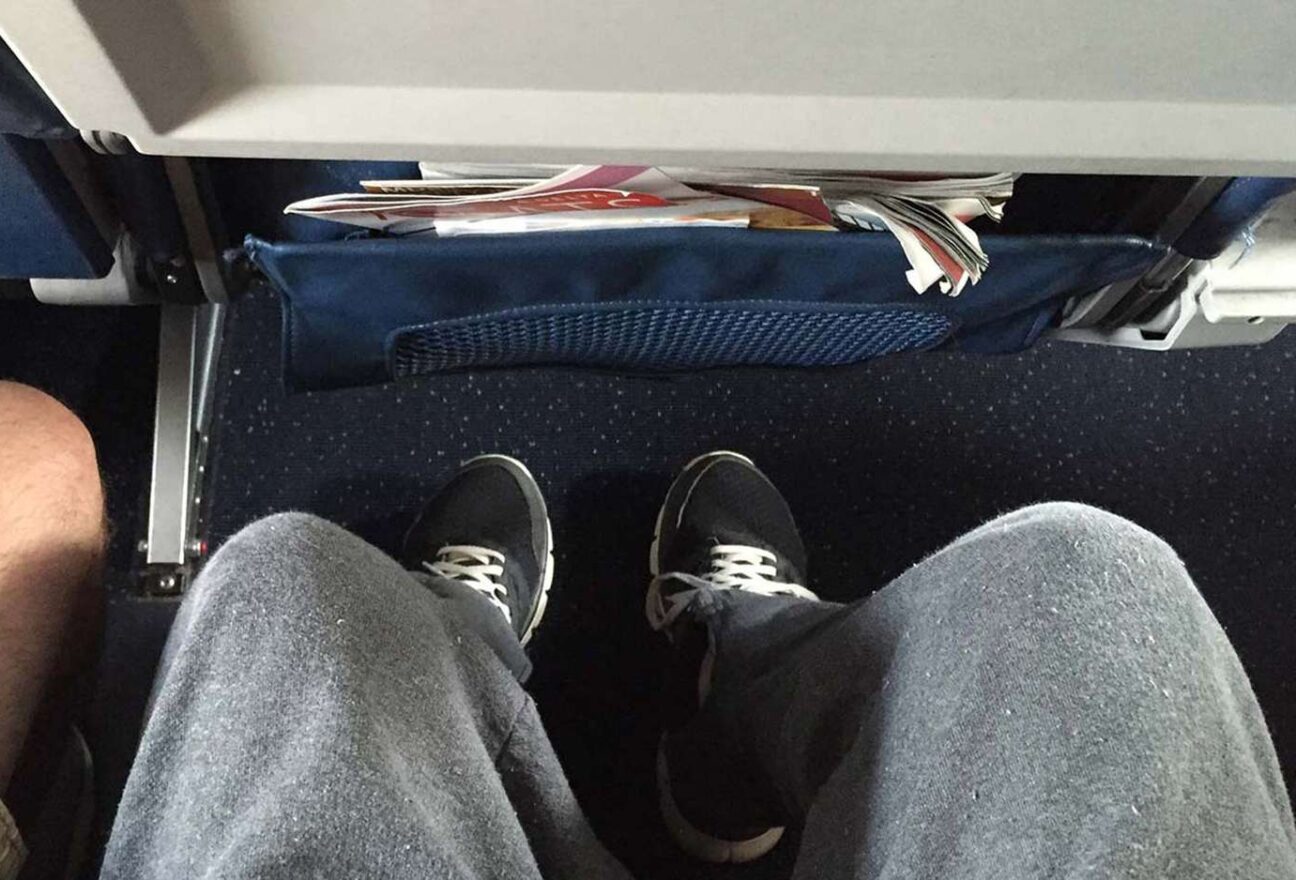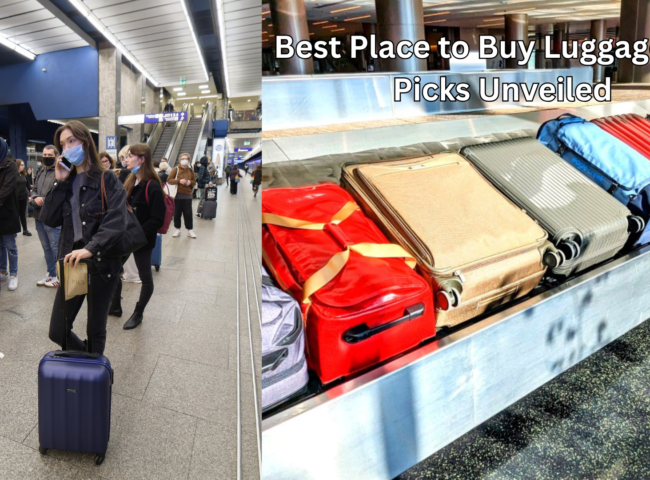The standard luggage size for under the seat typically doesn’t exceed 17 x 13 x 8 inches. This size ensures the bag fits comfortably in most airline cabin spaces.
Traveling light and efficiently often involves selecting the right size luggage to fit under the seat in front of you during a flight. Airlines have specific requirements for personal items to ensure they fit within designated spaces. Under-seat luggage allows passengers to access their essentials during flight without overcrowding the limited cabin space.
Air travelers are increasingly seeking compact, under-seat luggage to avoid the hassle of overhead bin restrictions and reduce time during boarding and deplaning. With the surge in baggage fees, these small bags have become a smart choice for economical and stress-free travel. It is essential to check with individual airlines as size allowances may vary, but adhering to the general dimensions mentioned can save you time and trouble at the gate.
Traveling Light: The Importance Of Under-seat Luggage
Packing light is more than a convenience; it’s a travel strategy. The space under the seat on planes, trains, or buses is your best ally. Let’s explore why small luggage matters so much for your journey.
Benefits Of Compact Packing
Saving time and stress at airports is big for travelers. Under-seat luggage means no waiting at baggage claims.
- Free from extra baggage fees
- Keep possessions close and secure
- Easy movement through crowded spaces
| Item | Value |
|---|---|
| Baggage Fees Saved | $30+ |
| Time Saved at Baggage Claim | 30 mins |
Under-seat bags also ensure important items are within reach.
Challenges With Overhead Bin Space
Overhead bins often get full quickly. This can cause worry and discomfort.
Fitting luggage into overhead bins is hard on full flights. Under-seat luggage eliminates this struggle.
- Less risk of having bags checked due to space
- Avoid the rush for overhead bin space
- No need to lift heavy bags overhead
Navigating Airline Restrictions
Travel savvy means knowing how to pack efficiently and fly comfortably. A crucial aspect involves understanding airline restrictions for luggage. Passengers often overlook the size limitations for carry-on items. This can lead to airport headaches. To ensure your journey starts on a positive note, it’s important to familiarize yourself with the rules.
Common Airline Size Guidelines
Airlines have clear guidelines for luggage that can fit under the seat. These dimensions typically vary from one carrier to another but generally fall within a certain range. To help you plan better, below is a handy reference for common under-the-seat luggage sizes:
| Airline | Dimensions in Inches (L x W x H) |
|---|---|
| American Airlines | 18 x 14 x 8 |
| Delta Airlines | 22 x 14 x 9 |
| United Airlines | 17.3 x 10 x 9 |
| Southwest Airlines | 18.5 x 8.5 x 13.5 |
Check your airline’s website before packing. This ensures your luggage fits under the seat.
Penalties For Oversized Luggage
Failing to comply with size guidelines can lead to penalties. Airlines may require you to check your bag if it exceeds the allowed size. This might incur additional fees. Below are some potential repercussions of oversized luggage:
- Extra fees for checked baggage
- Unexpected delays at the boarding gate
- Having to repack items at the airport
By staying within the size limits, you can avoid these inconveniences. Save time and money by measuring your luggage before your trip.
Choosing The Right Under-seat Luggage
Finding the perfect under-seat luggage is key to a stress-free travel experience. Your choice can affect your comfort, convenience, and even your wallet due to airline regulations. It must fit neatly under the seat, store essentials, and remain accessible throughout your journey.
Essential Features To Look For
Start smart with under-seat luggage that ticks these boxes:
- Size: Must adhere to airline standards
- Weight: Light enough to lift without strain
- Compartments: Designated pockets for organization
- Material: Durable to withstand wear and tear
- Wheels: Smooth for effortless mobility
- Handles: Sturdy for easy carrying
Top Brands And Models
Select luggage from established brands for quality assurance:
| Brand | Model | Size | Weight |
|---|---|---|---|
| Samsonite | Underseater Spinner | 16.5″ x 13.5″ x 9″ | 5.51 lbs |
| Travelpro | Maxlite 5 Rolling Underseat Bag | 17.5″ x 14.5″ x 8.5″ | 5.5 lbs |
| Delsey | Chatelet Soft Air Tote | 16″ x 12″ x 7.5″ | 4.6 lbs |
Packing Strategies For Maximum Efficiency
Traveling can often feel like a game of Tetris, fitting everything into a compact space. Knowing how to pack is crucial. Opt for maximum efficiency with a strategic approach. This ensures quick access while keeping your belongings organized and safe.
Essentials First: What To Pack
The key to packing smart lies in knowing what to pack first. Focus on the must-haves. These essentials ensure comfort and convenience during your journey.
- Travel documents: Keep them at arm’s reach.
- Electronics: Pack your phone, charger, and earphones.
- Sanitization items: Include hand sanitizer and wipes.
- Comfort items: Consider a neck pillow and a light scarf.
- Snacks: Select non-perishable, mess-free options.
Strategic Organization Tips
Organization is paramount. A well-organized bag saves time and stress. Use these tips for packing with precision.
- Choose the Right Bag: Pick a bag that fits easily under the seat.
- Use Compartments: Utilize pockets for quick access items.
- Go Modular: Consider packing cubes for clothes and accessories.
- Wrap Cords: Prevent tangling with cord organizers or clips.
- Rely on Zip Bags: They are perfect for liquids and small items.
Going Beyond Flying: Other Modes Of Travel
Exploring the delightful world of travel isn’t limited to just the skies. Lightweight and compact luggage becomes equally important when embarking on land adventures by train or bus, or setting out for a classic road trip. Accommodating your essentials snugly under the seat allows for convenience and ease, irrespective of your mode of travel.
Train And Bus Luggage Policies
Trains and buses have specific luggage guidelines that travelers need to follow. Unlike airplanes, there is less standardization across different companies, so checking the policy for your chosen carrier is key.
- Weight restrictions often apply.
- Size dimensions can vary, but under-the-seat luggage usually should not exceed 45 linear inches.
- Baggage fees may apply for extra or oversized items.
| Carrier | Max Size (Inches) | Max Weight (Pounds) |
|---|---|---|
| Amtrak | 28 x 22 x 14 | 50 |
| Greyhound | 25 x 17 x 10 | 25 |
Road Trips And Under-seat Storage
Road trips provide the ultimate flexibility, but packing smart is still critical. Maximizing under-seat storage increases the overall space for a more comfortable journey.
Choose multi-purpose bags that can serve as footrests or include additional pockets for quick access to items. Here’s what to remember:
- Select soft-sided bags, which can be more easily maneuvered into tight spaces.
- Ensure your bag can withstand regular use and fits neatly under seats.
- Utilize compression packing cubes to maximize your storage efficiency.
Caring For Your Under-seat Luggage
Smart travelers know that under-seat luggage is key to a hassle-free journey. Yet, many forget about care and upkeep. Good maintenance ensures your bag stays sturdy, clean, and reliable. Let’s dive into keeping your luggage in top shape, so it’s always ready for adventure.
Maintenance And Cleaning Tips
Regular maintenance extends the life of your luggage. Follow these simple tips:
- Empty pockets and compartments post-trip.
- Wipe down surfaces with a damp cloth.
- Use mild soap for stains or spills.
- Open to air-dry before storing away.
- Check zippers and wheels for smooth operation.
Longevity And Replacement
Your luggage is a travel partner. Treat it well, and it will go the distance. Look for these signs that suggest it’s time for a new companion:
| Sign | Action |
|---|---|
| Worn-out wheels | Time for repair or replacement |
| Broken zippers | Seek a professional or consider a new bag |
| Frayed edges | Assess if it’s cosmetic or structural damage |
Remember, a well-cared-for bag ensures stress-free travels under any seat.
Frequently Asked Questions Of Luggage Size For Under The Seat
What Size Luggage Will Fit Under Airplane Seat?
The ideal size for luggage to fit under an airplane seat is typically 18 inches x 14 inches x 8 inches. Always check with your specific airline for their under-seat dimensions.
What Size Is The Under Seat Cabin Bag?
Under seat cabin bags typically measure 17 x 13 x 8 inches to fit beneath airplane seats. Always verify with your specific airline for their allowed dimensions.
Can A 24 Inch Luggage Be A Carry-on?
Typically, a 24 inch luggage exceeds carry-on size restrictions for most airlines. Check your airline’s specific size guidelines to ensure compliance. Carry-on limits are usually 22 inches or less.
What Size Is A Personal Item Bag?
A personal item bag typically measures up to 18 x 14 x 8 inches, but airline specifications may vary. Always check with the specific carrier for their allowed dimensions.
Conclusion
Selecting the right luggage for under-seat storage doesn’t have to be a puzzle. With the key dimensions and airline restrictions in mind, you can travel hassle-free. Always double-check your carrier’s size guidelines to avoid any boarding delays. Smart packing elicits stress-free journeys, so choose wisely and tread lightly on your next adventure.
If you want to explore travel product click here







